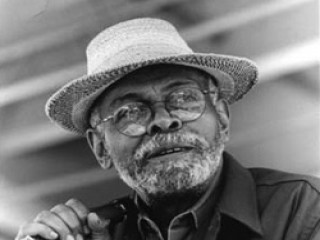
Amiri Baraka biography
Date of birth : 1934-10-07
Date of death : 2014-01-09
Birthplace : Newark, New Jersey
Nationality : American
Category : Famous Figures
Last modified : 2014-02-03
Credited as : Drama writer, poet and essayist, Hates Whitey
2 votes so far
Baraka studied philosophy and religion at Rutgers University, Columbia University and Howard University without obtaining a degree. In 1954 he joined the US Air Force, reaching the rank of sergeant.
After an anonymous letter to his commanding officer accusing him of being a communist led to the discovery of Soviet writings, Baraka was put on gardening duty and given a dishonorable discharge for violation of his oath of duty.
The same year, he moved to Greenwich Village working initially in a warehouse for music records. His interest in jazz began in this period. At the same time he came into contact with Beat, Black Mountain College and New York School poets. In 1958 he married Hettie Cohen and founded Totem Press, which published such Beat Generation icons as Jack Kerouac and Allen Ginsberg. Their literary magazine Yugen lasted for eight issues (1958–62). Baraka also worked as editor and critic for Kulchur (1960–65). With Diane DiPrima he edited the first twenty-five issues (1961–63) of their little magazine Floating Bear.
Baraka visited Cuba in July 1960 with a Fair Play for Cuba Committee delegation and reported his impressions in his essay Cuba libre. In 1961 Baraka co-authored a Declaration of Conscience in support of Fidel Castro's regime. Baraka also was a member of the Umbra Poets Workshop of emerging Black Nationalist writers (Ishmael Reed, Lorenzo Thomas and many others) on the Lower East Side (1962–65). He had begun to be a politically active artist. In 1961 a first book of poems, Preface to a Twenty Volume Suicide Note, was published, followed in 1963 by Blues People: Negro Music in White America—to this day one of the most influential volumes of jazz criticism, especially in regard to the then beginning Free Jazz movement. His acclaimed controversial play Dutchman premiered in 1964 and received an Obie Award the same year.
After the assassination of Malcolm X (1965), Baraka left his wife and their two children and moved to Harlem. Now a black cultural nationalist, he broke away from the basically white Beat Generation and became very critical of the pacifist and integrationist Civil Rights movement. His revolutionary poetry now became more controversial. A poem like “Black Art” (1969), according to academic Werner Sollors from Harvard University, expressed his need to commit the violence required to “establish a Black World.” Rather than use poetry as an escapist mechanism, Baraka saw poetry as a weapon of action. His poetry demanded violence against those he felt were responsible for an unjust society.
In 1966, Baraka married his second wife, Sylvia Robinson, who later adopted the name Amina Baraka. In 1967 he lectured at San Francisco State University In 1968, he was arrested in Newark for allegedly carrying an illegal weapon and resisting arrest during the 1967 Newark riots, and was subsequently sentenced to three years in prison; shortly afterward an appeals court reversed the sentence based on his defense by attorney, Raymond A. Brown. That same year his second book of jazz criticism, Black Music, came out, a collection of previously published music journalism, including the seminal Apple Cores columns from Down Beat magazine. In 1970 he strongly supported Kenneth A. Gibson's candidacy for mayor of Newark; Gibson was elected the city's first Afro-American Mayor. In the late 1960s and early 1970s, Baraka courted controversy by penning some strongly anti-Jewish poems and articles, similar to the stance at that time of the Nation of Islam.
Amiri Baraka died on January 9, 2014, at Beth Israel Medical Center in Newark, New Jersey, after being hospitalized in the facility's intensive care unit for one month prior to his death.
Author of books:
Preface to a Twenty Volume Suicide Note (1961, poetry)
The System of Dante's Hell (1965, novel, autobiographical)
Black Art (1966)
Black Music (1967)
Black Magic (1969)
Selected Plays and Prose (1979, collection)
Selected Poetry (1979, poetry)
The Autobiography of LeRoi Jones / Amiri Baraka (1984, memoir)
Wrote plays:
Dutchman (1964)
The Slave (1964)
The Toilet (1964)


















